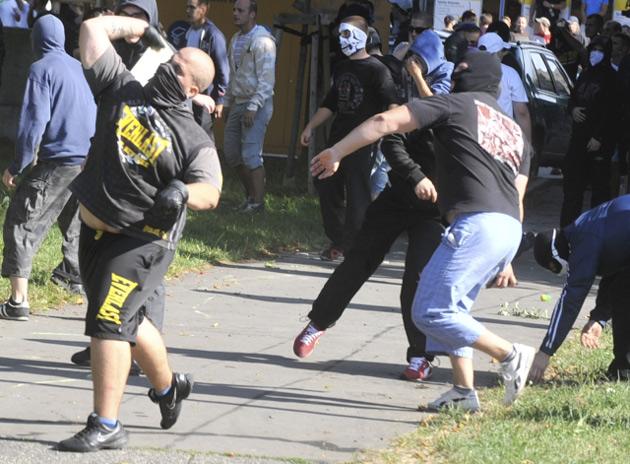Czech Republic: Hundreds of rampaging neo-Nazis attempt pogrom against Romani people in Ostrava

An anti-Roma march by neo-Nazis attended by between 600 – 800 people ended in clashes with police today in Ostrava. Police arrested more than 60 people and both neo-Nazis and police officers were injured.
The most serious incidents took place at the intersection of Mariánskohorská and Nádražní Streets. Police officers halted neo-Nazis there who had been doing their best to reach Svatopluk Čech Square, where a Romani demonstration had taken place before noon.
Bottles, firecrackers, garbage cans, rocks and smoke bombs were sent flying through the air. Police used tear gas several times.
For more on other hate marches that took place around the country, please see: http://www.romea.cz/en/news/czech/czech-republic-real-time-coverage-online-of-more-than-five-simultaneous-anti-roma-hate-marches
Around 600 – 800 neo-Nazis, according to police, met on Prokešovo Square in front of the New Town Hall in Ostrava just after 14:00, from where they then set out on a march through the town which other people joined. By that time, most of the approximately 600 Romani residents who had gathered on Svatopluk Čech Square were no longer there.
Organizers of the neo-Nazi event had supposedly reached agreement with representatives of the centrally-located Moravská Ostrava a Přívoz Municipal Department on the route the march would take. However, they abandoned that route once they were several dozen meters away from the town hall; instead of heading down Zborovská Street, they headed down Sokolská Street toward Svatopluk Čech Square in the Přívoz quarter.
Jana Pondělíčková, spokesperson for the municipal department, told the Czech News Agency that the local council had been unable to do anything about the fact that the marchers deviated from the announced route because the assembly as such had been officially ended before the march began. According to Regional Police Director Tomáš Kužel, police had no reason to intervene because the march was calm at the start and no one was committing any illegal behavior.
On Sokolská Street the neo-Nazis attempted a pogrom against the residents of the Halfway House (Dům na půli cesty), which is occupied by Romani people and others. "The demonstrators started throwing bottles and rocks, damaging the building and threatening the health and lives of the people living there, so police began to organize an intervention that last several hours," Kužel said.
The rampaging neo-Nazis continued on their way, and what had been a united mob until then broke up into different groups at Božena Němcová Orchard. The neo-Nazis began running in an effort to reach Svatopluk Čech Square, and some succeeded, but police then pushed them back.
Police held most of the demonstrators in the orchard, where clashes occurred. The mob finally moved toward the intersection of Mariánskohorská and Nádražní Streets, where several dozen more neo-Nazis who had been hiding in a nearby courtyard joined them.
The neo-Nazis then began assaulting police and destroying property. The most hard-core Nazis finally ended up on the outskirts of a local housing estate.
Neo-Nazis overturned garbage containers near the local supermarket and used bottles and rocks to assault police. However, the number of right-wing extremists involved began to gradually decline.
Just before 17:00, police officers used vehicles to barricade the intersection of Mariánskohorská and Nádražní Streets. Most of the demonstrators therefore fled toward the town center.
After 17:00, police officers called on the remaining dozens of protesters to vacate the scene. Police officers from an anti-conflict team did their best to negotiate with them.
Police subsequently arrested the radicals, several of whom were taken out of a restaurant on Nádražní Street, where some of the protesters had ended up. Public transport was disrupted during the protests, but service was restored in full at around 18:45.
According to Kužel, about 300 police officers directly participated in the security operation. The arrested right-wing radicals are suspected of bodily harm, rioting, and violence against public officials.
Kužel said many automobiles were damaged in the town, both civilian cars and the vehicles of police who participated in the intervention. The police director also said three police officers were injured as well as several right-wing radicals, although he was unable to give an exact number of protesters injured.
Kužel is of the opinion that police handled the intervention well. The situation in the town was calm by evening. "The situation in Ostrava is totally calm, there are no groups of people committing illegal behavior anywhere," he said after 19:00.
An anti-Romani demonstration entitled "Stop racial attacks" had originally been officially permitted to begin at the memorial in the Komenský Orchards. Pavel Matějný of the neo-Nazi "Czech Lions" (Čeští lvi) organization had attempted to organize a similar gathering, only to have it banned by authorities, but he eventually held his protest on Prokešovo Square.
Matějný joined forces with the organizer of the "Stop racial attacks" demonstration, and those attending that event moved to Prokešovo Square. There they signed petitions "For the rights of the decent citizen in the Czech Republic", demanding politicians harshly stamp out abuse of the welfare system.
Romani people had gathered on Svatopluk Čech Square before noon. Jolana Šmarhovyčová, an organizer of that event, said a total of six buses brought Romani residents to the scene of the protest from residential hotels around Ostrava.
There were several organizers wearing yellow vests and so-called security coordinators at the Romani event. "My task is to keep watch and make sure people don’t leave the square for the side streets, but that they stay here," one of them told the Czech News Agency before the event began.
The regional capital was besieged by municipal and state police several hours before the event began. Officers checked vehicles, including buses, traveling along the access routes into town.
Police used riot units, officers with dogs, and mounted police during today’s security operation. Anti-conflict teams were on the move around town and a police helicopter monitored the situation from the air. Both municipal and state police officers also used mobile video camera systems.